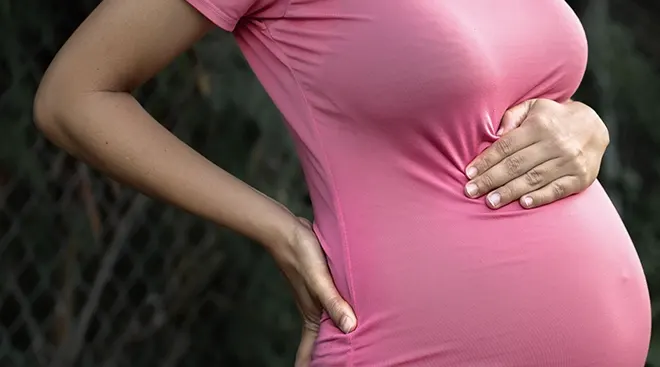Why You Might Have a Dry Mouth in Pregnancy
Is your mouth suddenly feeling like the Sahara? Chalk it up to yet another odd pregnancy symptom. Suffice it to say, dry mouth in pregnancy is common, but that doesn’t make it any less unpleasant. Fortunately, there are steps you can take to relieve your dry mouth during pregnancy (and the bad breath that may ensue). Here, read about some remedies to try, and find out when you should reach out to a doctor or dentist.
Wondering if you’re the only pregnant person walking around with an arid, desert-like mouth? Rest assured, you’re not! “Dry mouth in pregnancy is very common,” says Sarah Jebreil, DDS, a dentist at Dental Esthetics in Newport Beach, California. Pregnancy causes numerous hormonal changes in the body, which can lead to strange symptoms like an extra dry mouth. Below, a few different factors that can cause a dry mouth while pregnant:
- Changing hormones: No shocker here. Changing hormones during pregnancy can increase your risk of having a dry mouth. “As baby grows and hormones change, more water is needed to hydrate the body,” says Jebreil. Alexa Sassin, MD, assistant professor of obstetrics and gynecology at Baylor College of Medicine, agrees, adding that the fluctuations of sex hormones can also change your oral environment during pregnancy, leading to a dry mouth.
- Dehydration: It can be challenging to meet your hydration needs during pregnancy, and that can raise your risk of dehydration. “Dehydration can cause feelings of dry mouth because the salivary glands in the oral cavity produce less saliva when your body has inadequate fluids,” Sassin explains. What’s more, if you’re dealing with a dry mouth in early pregnancy, dehydration may be exacerbated by morning sickness or hyperemesis gravidarum, she adds.
- Swollen nasal passages: Increased levels of estrogen and other hormones in pregnancy can cause swelling in the throat and nasal passages. “As a result, pregnant women may have a stuffy nose and runny nose, without having a cold or allergies,” Jebreil says—and that can make your mouth feel dry.
- Snoring: You’re at a higher risk for obstructive sleep apnea—and consequently snoring and mouth breathing—during pregnancy, all due to physiologic and hormonal changes. “Changes in progesterone levels can affect ventilatory patterns in pregnant persons and nasal patency,” Sassin says. If you’re snoring or mouth breathing in your sleep, you’ll likely have a dry mouth when you wake up.
- Gestational diabetes: While Sassin points out that many people who are diagnosed with gestational diabetes don’t have symptoms when they’re diagnosed, Jebreil notes that high blood sugar levels can make you feel thirstier than usual and leave your mouth feeling dry.
Certain medications, like antihistamines, and autoimmune conditions like Sjogren disease may also be causing your dry mouth, says Sassin. Don’t hesitate to discuss this and any other symptoms with your provider. They’ll be able to do a thorough review of what could be causing your dry mouth during pregnancy.
Most of the dry mouth symptoms you’ll encounter will be the same as they were pre-pregnancy. Sassin says that some signs of a dry mouth while pregnant include:
- Feeling thirsty
- Feeling dryness on your tongue and palate
- Feeling dryness in your throat
- Mild oral discomfort
Having a dry mouth during pregnancy can be uncomfortable to say the least. Luckily, experts say there are a few easy things you can do at home to find relief.
- Drink more water: This one’s a no brainer: If you’re dealing with dry mouth, experts say drinking more water will help.
- Be mindful of your mouthwash: Mouthwashes that contain alcohol are very drying, Jebreil says. Instead, she suggests using products that are specifically formulated for dry mouths, like Biotene.
- Sleep with a humidifier: Sassin explains that these devices add more moisture to the air which can help combat dry mouth during pregnancy.
- Chew sugar-free gum: Chewing sugar-free gum or sucking on a sugar-free hard candy actually stimulates your salivary glands to produce more saliva, reducing dry mouth in the process, Sassin says.
- Stay on top of your oral hygiene: It may surprise you, but dental care is very important during pregnancy, as gingivitis and gum disease have been linked to preterm labor, Jebreil says. Plus, adequate dental care can help relieve some of those pesky dry mouth symptoms. Make sure you brush twice a day and stay on top of your routine dental appointments during pregnancy, Sassin says.
These at-home remedies can help, but if something more serious, like an oral infection, is causing your pregnancy dry mouth, you’ll need to see your provider for treatment.
There are a few signs it’s time to talk to your doctor about your dry mouth. If you have white patches inside your mouth, it can be a sign of a fungal infection like thrush, Jebreil says. Moreover, if you’re especially tired during the day, it may be a sign of a sleep disorder, she says.
Of course, you should always talk to your doctor if you’re uncomfortable or have any outstanding questions about your oral health.
Frequently Asked Questions
Is dry mouth a sign of pregnancy?
While a common pregnancy symptom, dry mouth is an unreliable way to assess pregnancy. Early pregnancy symptoms may abound, but the only way to accurately determine pregnancy is with an over-the-counter pregnancy test or blood test.
Is bad breath common in pregnancy?
Unfortunately, bad breath is common in pregnancy, and it’s linked to having a drier-than-usual mouth. “The lack of salivary flow compromises the antimicrobial action of the saliva,” Sassin says. Plus, it can cause increased stickiness, leading to more bacteria and plaque sticking to the tongue and teeth. “The bacteria in the plaque produce sulfur, which ultimately leads to bad breath,” Jebreil explains. To counteract this, she recommends staying on top of your oral hygiene and getting extra dental cleanings during pregnancy.
Why are my lips so dry during pregnancy?
There are a few causes of dry lips during pregnancy, including cold and dry air and dehydration. “While counterintuitive, licking your lips can also further dry them out,” Sassin says. “As the saliva further evaporates, more moisture is removed from the lips.”
How much water should I drink during pregnancy?
It’s a good idea to drink 64 to 96 ounces of water—equal to 8 to 12 cups—a day when you’re pregnant, according to the American College of Obstetricians and Gynecologists (ACOG).
Please note: The Bump and the materials and information it contains are not intended to, and do not constitute, medical or other health advice or diagnosis and should not be used as such. You should always consult with a qualified physician or health professional about your specific circumstances.
Plus, more from The Bump:
Sarah Jebreil, DDS, is a dentist at Dental Esthetics in Newport Beach, California. She earned her bachelor’s degree from the University of California, Irvine and her DDS from the University of the Pacific School of Dentistry.
Alexa Sassin, MD, is assistant professor of obstetrics and gynecology at Baylor College of Medicine. She earned her medical degree from and completed her residency at Baylor College of Medicine.
Brazilian Dental Journal, How Common is Dry Mouth? Systematic Review and Meta-Regression Analysis of Prevalence Estimates, December 2018
Cleveland Clinic, Diabetes and Dry Mouth, March 2022
Journal of Natural Science, Biology and Medicine, Periodontitis: A risk for delivery of premature labor and low-birth-weight infants, December 2010
American College of Obstetricians and Gynecologists, How much water should I drink during pregnancy?, October 2020
Learn how we ensure the accuracy of our content through our editorial and medical review process.
Navigate forward to interact with the calendar and select a date. Press the question mark key to get the keyboard shortcuts for changing dates.




















































